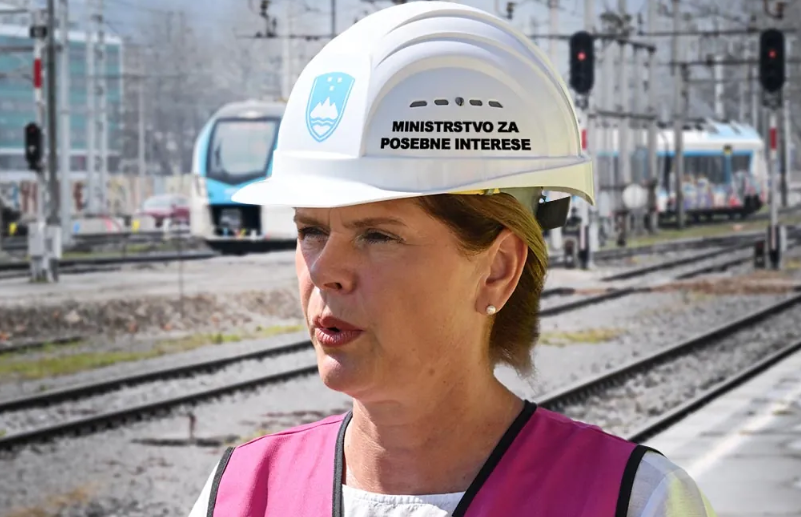The renovation of the Jesenice railway station was only the most publicly exposed of the Ministry of Infrastructure’s public financial excesses. There is also the renovation of the Nova Gorica railway station, the upgrade of the Ljubljana railway station and the Maribor-Šentilj line. The Ministry of Infrastructure will soon reopen the budget purse (for known players).
Some time ago, the announcement of the outcome of two public tenders at the Ministry of Infrastructure arrived in the inboxes of some media outlets, including ours. The author of the message announced, somewhat mysteriously, that of the two tenders, one would go to a construction company which could be found somewhere between Ljubljana and Primorska, and the other to a construction company from Dolenjska.
Here is what he wrote: “We have two interesting tenders, the Krško railway station and the Vanje Gorice-Preserje railway station. In these two tenders, it is also interesting to note what is happening on the public procurement portal and the extraordinary lobbying of the current cartel consortium to win two more super contracts. Everything is being done to preserve the existing pool of contractors. One contract is definitely for the construction company from Dolenjska and the other for the construction company between Ljubljana and Primorska.”
The only bidder wins!
The outcome of the first project is already known. The upgrade of two railway stations, Brezovica and Preserje, and the construction of the Vnanje Gorice railway station and underpass with connecting roads (this is also the title of the tender) was awarded to a group of contractors led by Kolektor or Kolektor Koling. Our source, who alerted us to the outcome of the tender, was right.
The consortium also includes the companies SŽ – ŽGP, Kolektor Igin, Gh Holding and CGP. This time, more than 138 million euros will go into the contractors’ pockets. The value of the offer is expected to exceed the previously estimated value of the project.
A tender rigged for one contractor?
Communication between potential bidders and the contracting authority, the Ministry of Infrastructure, reveals another interesting fact. On the 27th of September, a proposal was sent to the Ministry to relax one of the tender conditions. The tender conditions required that the tenderer had “successfully carried out at least one project for the new construction or upgrading of a railway line in the European Union area with a value of at least 15,000,000.00 euros excluding VAT over the last ten years”. One potential tenderer proposed to reduce the value of a project carried out in the past by 10 million euros. “In this way, the contracting authority would be able to obtain more bids for the tender. It is extremely difficult to obtain this kind of reference given the situation on the Slovenian market, or there is only one reference of this kind,” the proposer wrote. The Ministry, however, refused to change the tender conditions.
It could be speculated that such a high condition was written to suit the winner of the tender – Kolektor Koling, which is part of the Kolektor concern. Today, the CEO of the Kolektor Group is Valter Leban, but for the general public, the first face of the group is Stojan Petrič, otherwise the Chairman of the Supervisory Board.
But this is far from being the only project. A consortium led by Kolektor Koling (along with the companies SŽ – ŽGP, Gh Holding and Iskra) has also been awarded the contract for the renovation of the Nova Gorica railway station, worth 50.71 million euros. The media outlet Svet24 reported some time ago that the consortium submitted a bid 18 million higher than the Works Directorate’s estimate, but still managed to win the deal.
Kolektor Koling has a very rich cooperation with the state. So far, more than half a billion euros have flowed from the taxpayer’s coffers into the company’s account. According to Erar – the online application for the portrayal of public spending in the Republic of Slovenia, the first revenues from the state started in 2004 and then remained at a rather low level for several years. They exploded at the end of 2022 and 2023.
Ministry for Special Interests
Minister Alenka Bratušek had to face accusations of overpricing construction projects and pandering to capital interests after the disclosure of the value of the renovation of the Jesenice railway station. The renovation project was awarded to Škrabec’s company RIKO, which had asked for 170 million euros for the renovation. Later, the Minister hired external auditors for the deal, who concluded that the project was urgently needed, that the designers’ estimate of the costs was too low, and advised against a retender, stressing how good it was for Slovenia to choose domestic contractors. In short, they justified the expectations of the client to the letter, and their conclusions were entirely in line with the capitalist interests of the left.
Our source, who predicted the outcome of both tenders, is convinced that the background for all these outcomes is the typical cartel collusion and rigging of the tenders with the ultimate goal of enriching a few individuals. But there might be more to it than “enriching individuals”. It could also be argued that there is a systematic financing of the economic-political lobby of the transitional left happening, which, until the 1st of June 2021, was grouped together in the organisation Forum 21. Both RIKO and the Kolektor Group can be linked to this association.
Was our source right?
The second call for tenders for the upgrade of the railway line between Dobova and Zidani Most has not yet been finalised. It was launched on the 22nd of August 2024, and the deadline for applications for the tender will expire soon, on the 18th of December 2024. As the source said in the e-mail, can we expect a victory for the construction company from Novo mesto – CGP? We will probably find out before the end of the year.
Ž. K.


